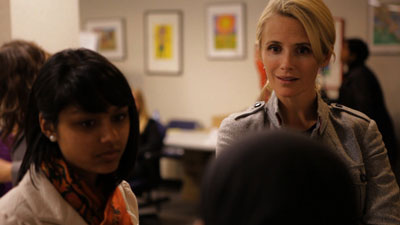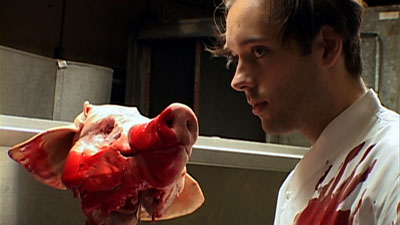Like drawing back a curtain to let bright light stream in, “Miss Representation” uncovers a glaring reality we live with every day but fail to see. Written and directed by Jennifer Siebel Newsom, the film exposes how mainstream media contribute to the under-representation of women in positions of power and influence in America. The film challenges the media’s limited and often disparaging portrayals of women and girls, which make it difficult for women to achieve leadership positions and for the average woman to feel powerful herself.In a society where media is the most persuasive force shaping cultural norms, the collective message that our young women and men overwhelmingly receive is that a woman’s value and power lie in her youth, beauty, and sexuality, and not in her capacity as a leader. While women have made great strides in leadership over the past few decades, the United States is still 90th in the world for women in national legislatures, women hold only 3% of clout positions in mainstream media, and 65% of women and girls have an eating disorder. Stories from teenage girls and provocative interviews with politicians, journalists, entertainers, activists and academics, like Condoleezza Rice, Nancy Pelosi, Katie Couric, Rachel Maddow, Margaret Cho, Rosario Dawson and Gloria Steinem build momentum as “Miss Representation” accumulates startling facts and statistics that will leave the audience shaken and armed with a new perspective.
Miss Representation
Filmmaker(s)
Running Time
Miss Representation
Filmmaker Notes:
What inspired you to make “Miss Representation”?I was inspired to make “Miss Representation” for several reasons. First, I witnessed an injustice towards women in the media that has worsened over time with the 24-7 news cycle and the advent of infotainment and reality television. Today’s media is sending a very dangerous message to young people, in particular, that women’s value lies in their youth, beauty, and sexuality and not in their capacity as leaders. Second, I realized that despite the assumption in America that men and women are equal (well, Hilary Clinton ran for President after all…), women’s leadership seems to peak at 17 percent representation – only 17 percent of Congress are women, 3 percent of media clout (or decision-making) positions are women, and 3 percent of Fortune 500 CEOs are women. These numbers are abysmal, women still make around 75 cents on the man’s dollar, and there are so few corporations in America that actually provide flex time or paid family leave so that women can continue on their career paths while raising young families. Finally, and closest to home, I was compelled to make this documentary because I was horrified by the thought of raising a daughter in a culture that demeans and degrades and disrespects women on a regular basis. Miss Representation is my attempt to right this wrong and put our culture on a path that recognizes and empowers women and girls. Women can no longer be portrayed as second-class citizens but rather as equals to men with equal opportunities to succeed in life. Tell us how the project came together, and some of the organizations that have already gotten behind the film. “Miss Representation” started as a conversation between various friends and myself around the injustices towards women in the media and therefore in our culture. And, ultimately, it grew into a cause oriented film and movement where we are fortunate enough to have partnerships with the likes of Common Sense Media, the Geena Davis Institute on Gender in Media, Step Up Women’s Network, Girls Inc., Girls for a Change, The White House Project, Women’s Media Center, and the International Museum of Women. Tell us about the interview process. Specifically, how did you get access to such influential women and leaders in their respective fields? Thanks to a lot of hustle and persistency and women supporting women, we got family and friends and friends of friends of friends to tell each other about the project and convince our interviewees that we weren’t going to play gotcha. We just wanted to hear their stories and make this really important film for the world, and that they needed to be a part of it. That’s how it happened. What was the most shocking thing you learned while researching the film? One of the most shocking things I learned while making “Miss Representation” is that 15 percent of rape victims are girls under the age of 12. Now, if this isn’t despicable and horrifying, I am not sure what else is. What was the most inspiring? One of the most inspiring things I learned while making this film is that people do care and that they do want to see change. Thanks to all of our partner organizations and academics and their incredible advocacy, activism and research, we now have the tools to question the media that perpetrates violence and degradation towards women. This gives me tremendous hope and confidence that we will have an impact. Do you have a favorite interview or a particular subject that stands out in your mind when you look back at the film? All of the women and men struck a chord with me and with the members of our crew. And the youth were particularly moving. If I had to pick just one, perhaps it would be Rachel Maddow, who deals with sexism on a regular basis with humor and grace. We can all learn something from that. With this being your first feature, tell us about your filmmaking process. Let’s just say I asked a lot of questions, learned to trust my gut, and surrounded myself with people who were not only talented but very supportive. I have to admit though, I had NO IDEA making a documentary film could really take over 2 years. I am a rather impatient person and am proud I stuck it out as I had to overcome many obstacles and hurdles in the making of the film. Fundraising was by no means easy initially; I was picked apart as director/narrator; I felt very alone throughout much of the process – until I found my editor Jessica Congdon; who is a total collaborator, so smart and such a star. I had to deal with ugly energy every day in our research; and, being a sensitive person, it was at times too much for me. It got to the point, where I’d walk into the room and my husband had the TV on and I had to walk out as he was watching the news and it would cut to a reality show or a commercial and I couldn’t help but cringe at the messages being communicated about what it is to be a woman or a man in our culture. It really saddened me. Not only that, but you know how when advertisements come on TV and the volume rises? I would be incensed. Were there any obstacles or challenges you had to overcome during production? Many! In addition to the challenges of the filmmaking process, my editor Jess and I both had daughters about the same time soon after she started working with me. Being that this was my first child and I didn’t take maternity leave, I was exhausted and overwhelmed. However, with such an amazing team of women behind “Miss Representation”, our triumphs far outnumbered the obstacles and I believe I learned from all of the challenges. What do you want the audience to walk away with after the first screening? I want our audience to be educated, inspired, motivated and entertained. I want them to feel compelled to talk about it, tell others to go see it, and share information from the documentary with their loved ones and colleagues. I want them to feel empowered that they can do something about media injustices and that they can affect change. Then, I want viewers to think more critically about the subtleties of sexism that we’ve come to accept in our culture. And, ultimately, I want our audience to leave motivated to join our social action campaign to affect change for women and girls. What do you believe is the most important thing individuals can do to change the portrayal of women in the media? It is extremely important that we champion good media and challenge bad media. Women hold more than 86% of America’s purchasing power and we have to use our power as consumers. We have to write our corporate media leaders to encourage socially responsible business practices. We need to connect the dots for our political leaders so they might advocate for better policies for women and improved social responsibility. We have to build community among individual women and girls. It comes down to the fact that we have to be the change we wish to see in the world. Tell us a little about the social action campaign that is being launched with the film. Our social action campaign is being led by MissRepresentation.org. The campaign seeks to empower women and girls to challenge limiting labels in order to fully realize their potential, and ultimately transform our culture for the betterment of all. Utilizing social media, like Facebook and Twitter, MissRepresentation.org is organizing hundreds of thousands of individuals to participate in a series of small actions that will ultimately lead to a cross-generational revolution to eradicate gender stereotypes and create lasting cultural and sociological change that will benefit not only women, but the world at large. We also have an education curriculum focused on gender in the media, and we will be working to get this in both K-12 schools as well as Universities across the country. And we’re not going to stop championing women until we see change—until we see a world where women are treated equally.


